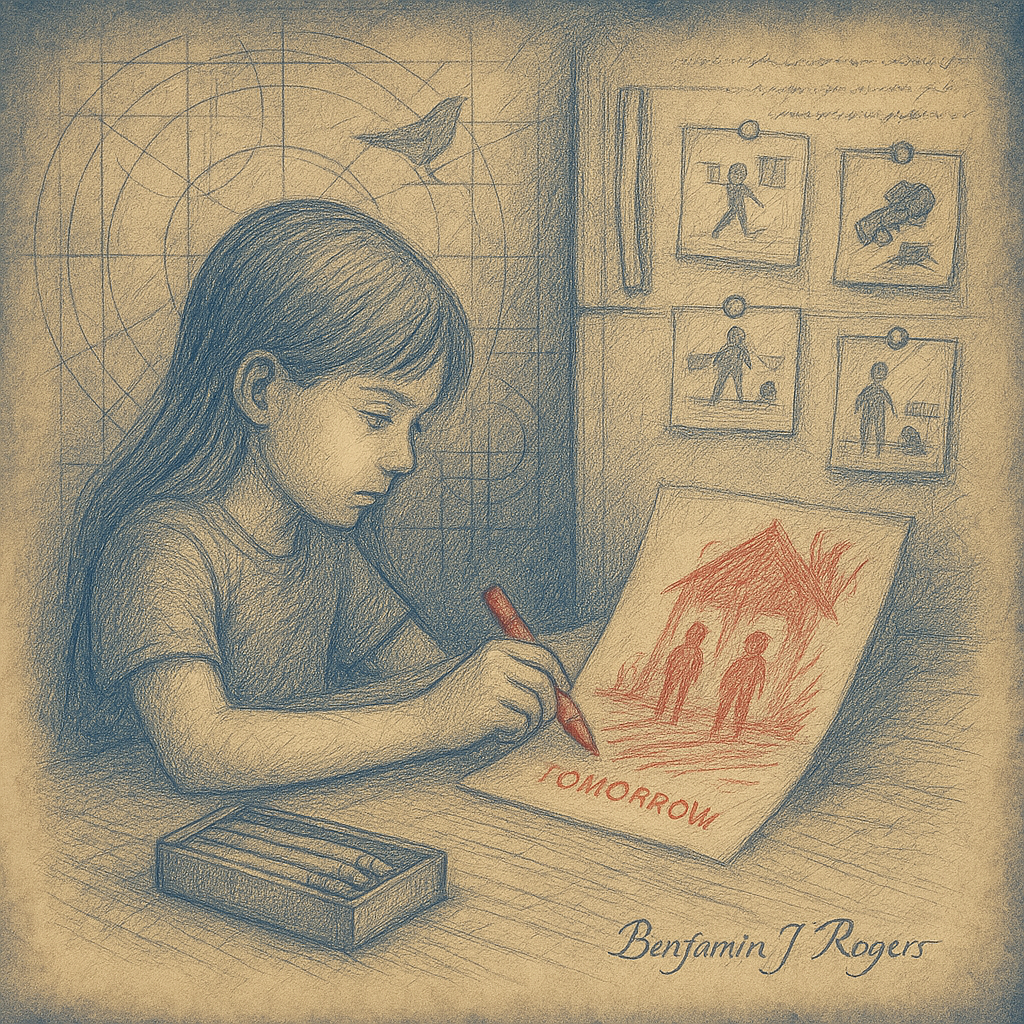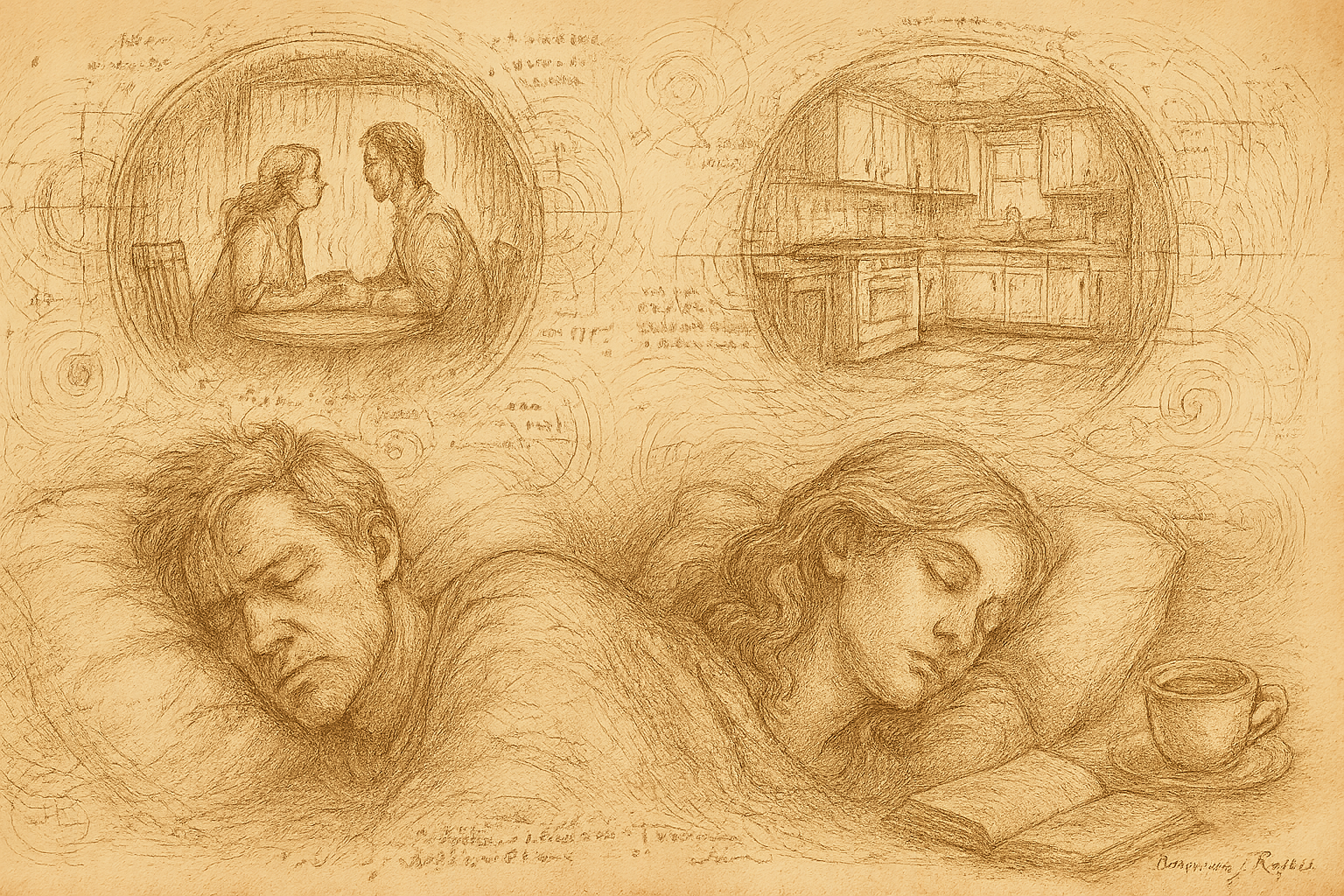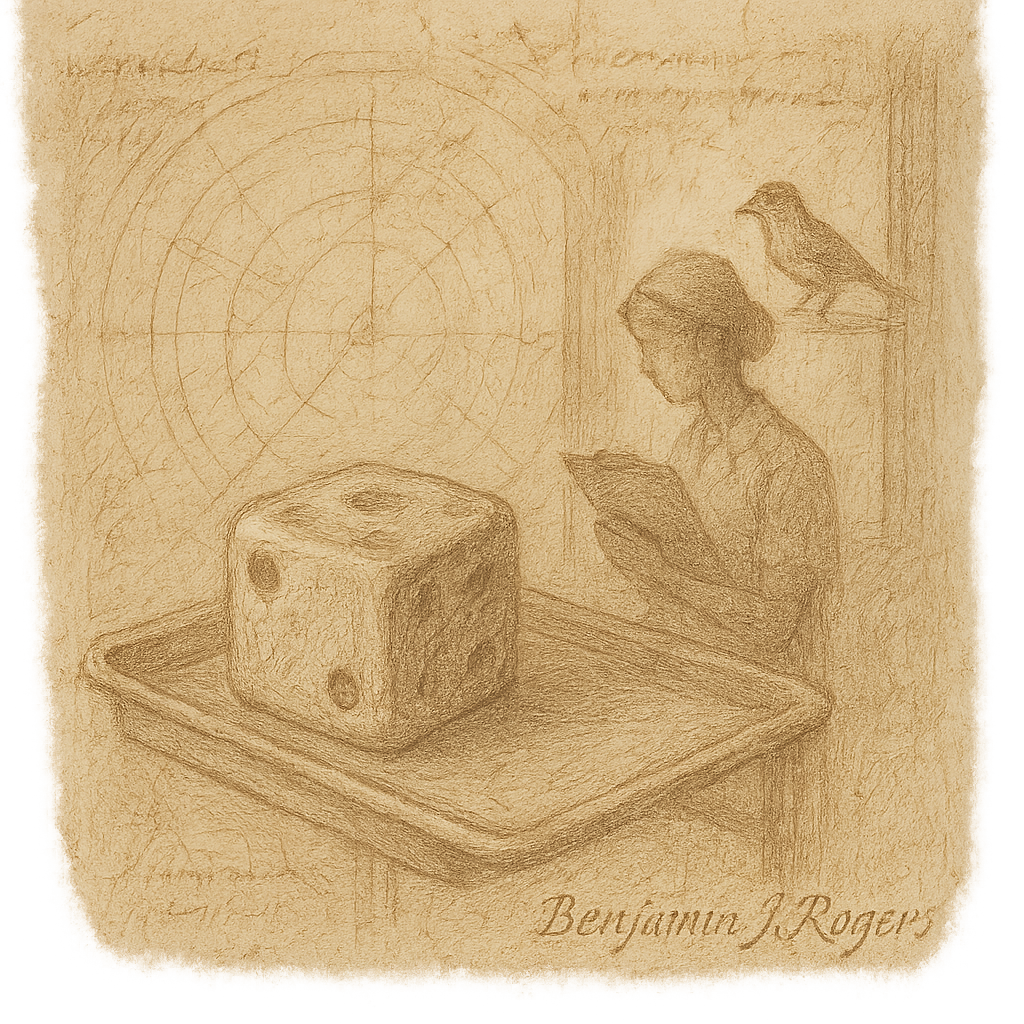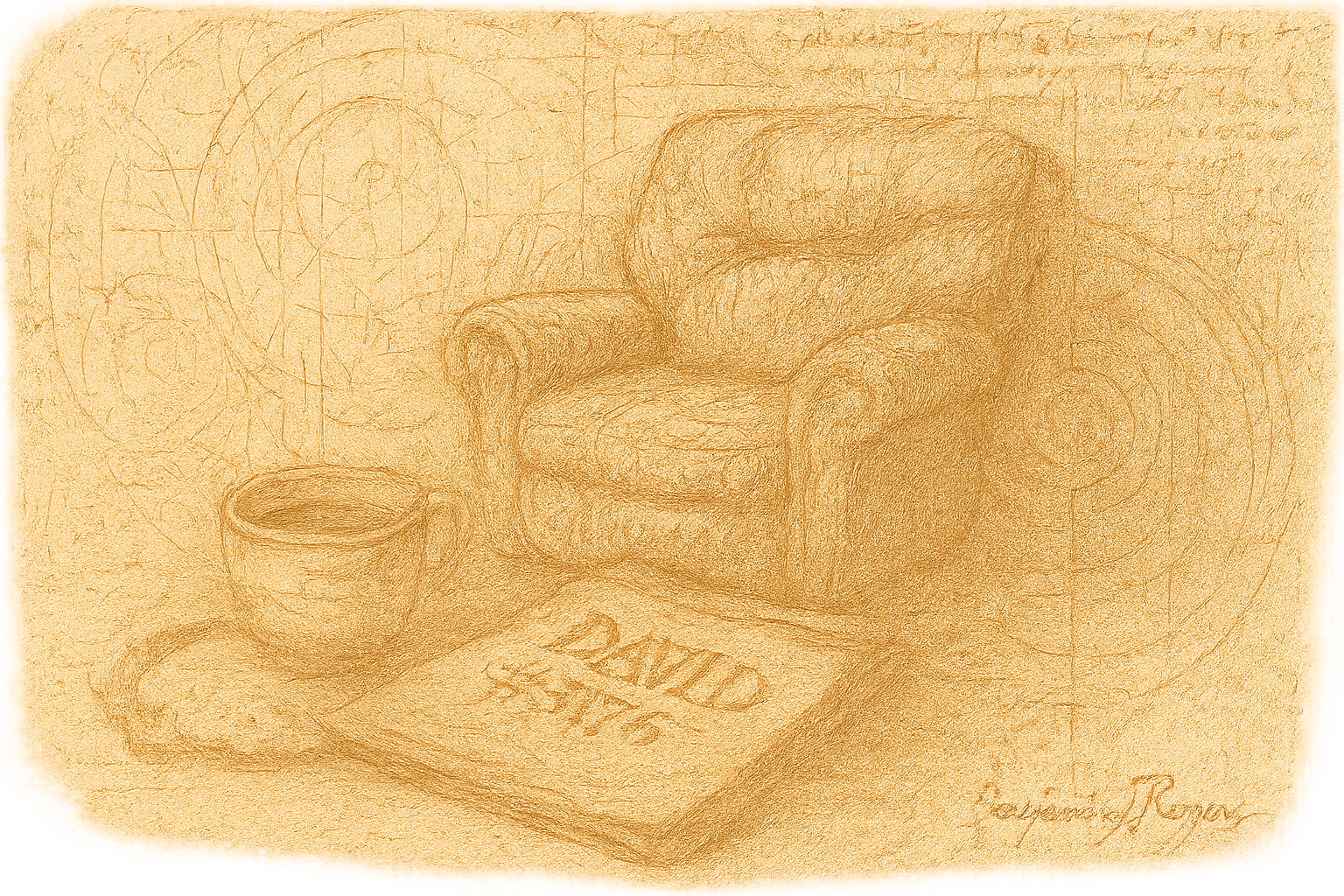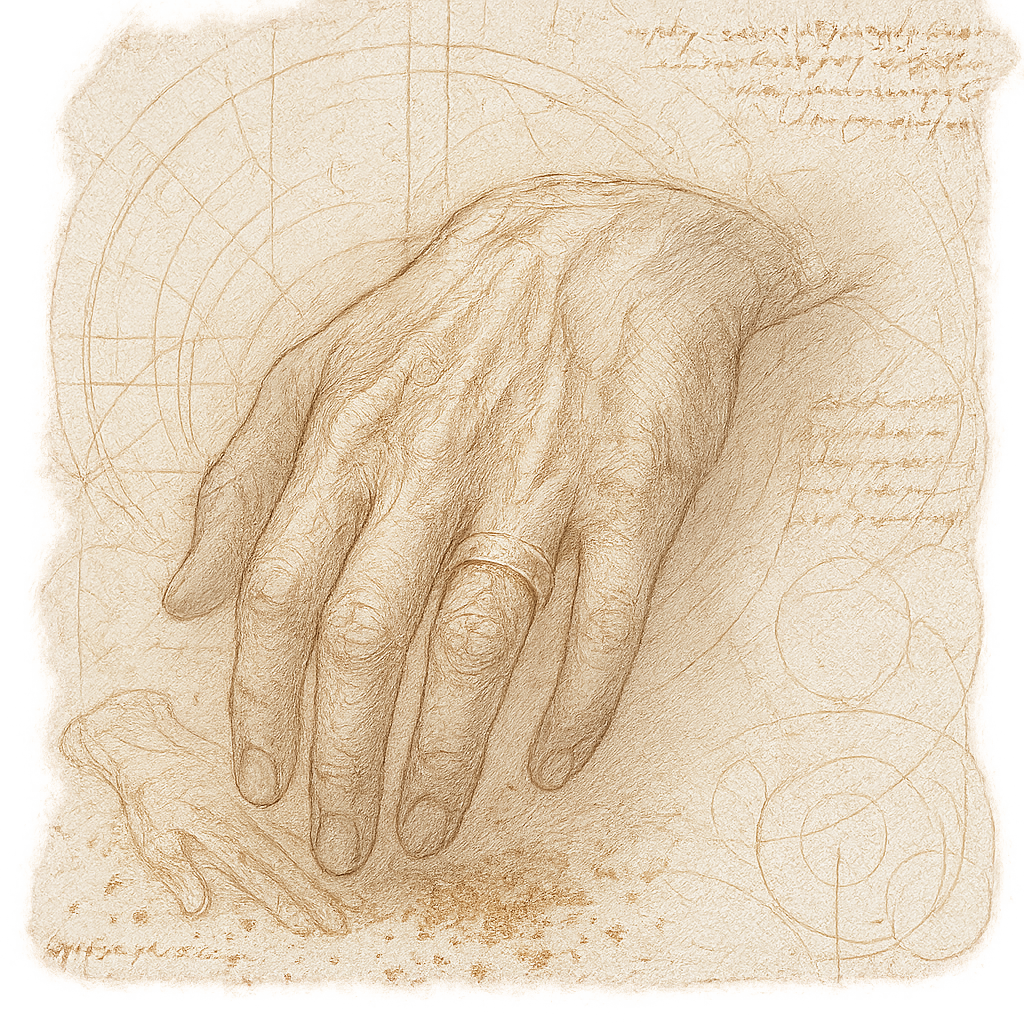Red Crayons
Emma draws in red crayon exclusively now. Has for three weeks.
The refrigerator gallery tells the story: stick figures falling from windows, cars wrapped around trees, kitchen knives beside sleeping forms. Each drawing dated in her careful seven-year-old handwriting. Each drawing coming true within forty-eight hours.
"It's just coincidence," Michael says, but his voice catches on the word. He's been checking the local news obsessively since Mrs. Henderson died exactly as Emma had sketched—face-down in her garden, roses scattered around her head like a gory halo.
The crayon box sits open on Emma's desk. Twenty-three colors untouched. Red worn down to a stub.
"Draw something happy," Sarah pleads, kneeling beside their daughter's chair. "Draw flowers. Draw puppies."
Emma looks up with eyes that seem too old, too knowing. "I don't choose what to draw, Mommy."
Her small hand moves across the paper with mechanical precision. A playground. Swings. A man in a baseball cap pushing a little girl—but the swing's chain snaps, and the girl flies forward into concrete that Emma colors with careful, even strokes.
Sarah snatches the paper away.
"No."
Emma blinks once. Reaches for a fresh sheet.
The pediatric psychiatrist speaks in measured tones about childhood anxiety manifesting through art therapy. About how traumatic exposure to news media can create prophetic fantasies. She prescribes play dates and screen time limits, as if schedule adjustment can stop whatever flows through Emma's fingers onto paper.
That night, Michael burns the drawings in their backyard fire pit. Each paper curls and blackens, releasing smoke that tastes like copper pennies and salt water. Sarah watches from the kitchen window, arms wrapped around herself, as her husband tries to incinerate the future.
But Emma keeps drawing.
The swing accident happens Tuesday morning. Channel Seven shows the footage: little girl airborne, chain link dangling, impact that turns parents away from their screens. Michael and Sarah recognize the playground. The baseball cap. The precise angle of Emma's prophetic geometry.
Emma colors at her desk, humming something that might be a lullaby or might be a dirge. Her latest picture shows a house—their house—with flames licking the windows. Two adult figures stand in the doorway, not running, just standing. Waiting.
Below the drawing, in her careful script: Tomorrow.
Sarah finds matches in the kitchen drawer. Michael discovers gasoline in the garage.
They look at each other across the kitchen table where Emma's picture lies between them like a roadmap to nowhere good. Outside, night falls with unusual weight. Inside, the house creaks with the sound of structure settling into its final configuration.
Emma appears in the doorway, red crayon in her fist.
"Don't be sad," she says. "I drew us together."
Night Vision
Dreams hover like holograms above sleeping heads.
Above Marcus: a coffee shop that doesn't exist, rain on windows that never were. The woman across from him wears Elena's face from ten years ago—before the miscarriage, before the promotion that stole her laughter, before her eyes learned to inventory his failures. Dream-Elena reaches across the table, fingers lacing through his with the hunger of someone who still wants him. She whispers something that makes his sleeping body smile. The vision hovers eighteen inches above his skull, sharp as accusation, clear as verdict.
Elena watches from their bed—book closed, spine cracked, page forty-seven abandoned like everything else. His unconscious theater plays the same scene: kiss across café table, light catching in hair that moves like Elena's used to, before mortgages and midnight feedings carved lines around her eyes. Seventeen nights. Same woman. Same gentle betrayal floating above his head like morning mist.
"Morning," he says, eyes opening.
She doesn't answer.
Above her sleeping head—though Marcus pretends not to see—their apartment from twelve years ago materializes in gossamer detail. Kitchen cabinets painted bright yellow, weekend project that took three tries to get right. Her voice younger, reading him sonnets she'd written on napkins. His dream-self listening with the patience of someone who doesn't yet know that love calcifies. The vision shimmers above Elena's pillow like heat rising from summer asphalt—memory refined into gold leaf, too beautiful to touch.
Marcus knows this museum too.
He rolls toward the wall. Clock face: 7:43.
"Coffee?"
"Sure."
Neither moves.
The marriage counselor's voice echoes: Dreams lie. They exaggerate. Distort.
But Marcus returns to that coffee shop like a pilgrimage. And Elena's unconscious rebuilds their history with surgical precision—each memory lacquered until it shines, perfect and unreachable.
She rises. Feet on cold wood.
In the kitchen, she measures grounds with surgical precision. Three scoops. Two cups.
Above their empty bed, the dream-space hovers blank and merciless.
Marcus appears in the doorway, hair standing at angles, eyes avoiding hers. They've seen too much. The terrible democracy of sleep—no privacy, no lies, just the raw feed of want and memory projected like home movies nobody asked to watch.
"Elena—"
"Don't."
The coffee maker gurgles. Steam rises like incense from a funeral they haven't announced yet.
She pours. Black for him, cream for her. The ritual of two people who know exactly how the other takes their caffeine and nothing else that matters.
Marcus sits. Drinks. Burns his tongue.
Above him, faint as morning light, another dream begins to form—Elena packing suitcases, moving through rooms that echo with absence.
She sees it too.
The coffee grows cold between them.
The Roll
The die sits on the hospital tray like a tumor made of plastic. Six sides. Six decades, maybe. Or six months.
Martha's fingers hover above it - liver-spotted, trembling from something deeper than age. The nurse waits by the window, clipboard pressed against her chest like armor. Outside, a sparrow lands on the sill, cocks its head, and flies away.
"The system's fair," Dr. Chen had said, adjusting his glasses with the practiced ease of a man who'd never rolled. "Random distribution. No bias toward wealth, status, genetics." His voice carried the hollow ring of someone quoting policy. "Everyone gets their chance."
Their chance.
Martha thinks of her grandson, Tommy, who rolled a four last Tuesday. Four years. He'd laughed - actually laughed - and asked if he could have ice cream for breakfast now. His mother cried into dish towels for three days.
The die catches the fluorescent light. Cheap plastic, probably made in some factory where workers roll their own dice at sixteen, get their numbers, plan accordingly. Or don't plan. What's the point of a 401k when you might roll snake eyes?
"Mrs. Patterson?" The nurse's voice is gentle, rehearsed. How many times today? How many dice sit on how many trays in how many rooms?
Martha remembers when people died of things. Cancer. Accidents. Time. Now they die of mathematics. The Randomization Act passed when she was forty - old enough to be grandfathered in, young enough to watch her children grow up knowing their expiration dates.
Her daughter rolled a five. Fifty years. Reasonable. Manageable. She bought a house, had Tommy, divorced his father when she calculated she couldn't waste time on lukewarm love.
Tommy's father rolled a two.
Martha picks up the die. It's lighter than expected, hollow maybe, like everything these days. She thinks of prayers - not to change the outcome, but for grace to accept it. Six sides. Each one a different weight of grief.
The sparrow returns to the window.
She closes her eyes and lets gravity decide.
The die tumbles across metal, sound sharp as winter. When it stops, she doesn't look. Instead, she watches the sparrow tap the glass with its beak - once, twice, three times - before vanishing into the boundless, unmeasured sky.
The nurse writes something down.
Martha still doesn't look.
Outside, the world spins on, indifferent to numbers, dice, and the small mathematics of mortality. She thinks this might be the point - not the rolling, but the moment after, when you choose what to do with whatever time the universe has dealt you.
Even if it's only long enough to count to six.
Terms of Renewal
The manila envelope arrived on Tuesday, three days after the funeral. Margaret held it against the kitchen window, squinting at the familiar letterhead through morning light that cut the paper thin as communion wafer.
EternalCare Insurance Solutions.
She'd forgotten about David's policy - seventeen years of monthly payments, automatic deduction, the kind of insurance you sign and never think about until the unthinkable thinks about you. The coffee maker gurgled behind her, a sound like drowning in reverse.
"Congratulations," the letter began, "your claim has been approved."
Her hands shook. The envelope crackled.
Margaret had buried David four days ago in plot 247-C, next to the Hendersons' granite angel. She'd chosen the mahogany casket, upgraded the liner, paid the fees. The finality of signatures. The weight of dirt on wood.
But here: Section 12-B. Resurrection coverage. Active as of policy inception.
"Processing time: 72-96 hours post-mortem."
The phone rang. She answered without thinking.
"Mrs. Patterson? This is Carol from EternalCare customer service. I'm calling regarding claim number EC-2847-X. Your husband's resurrection is scheduled for this afternoon."
Margaret's coffee cup met the counter harder than intended. Brown liquid spread toward the letter.
"I - what?"
"Standard procedure, ma'am. The mobile unit will arrive between two and four. Please have identification ready and ensure the original burial site is accessible."
"But he's - " The words caught somewhere between her throat and the impossibility. "He's been dead for four days."
"Yes ma'am, that's within our service window. Is there anything else I can help you with today?"
The line went dead.
Margaret stared at the coffee stain bleeding through David's resurrection paperwork. She thought of his final breath in the hospital - that long exhale that seemed to empty not just his lungs but the entire room. The way his hand went slack in hers, wedding ring sliding loose on his finger.
Now they wanted to bring him back.
She drove to the cemetery at quarter past one, the letter folded in her purse next to David's reading glasses. The maintenance crew had already exhumed plot 247-C. The casket sat beside the open grave like a question mark punctuated with dirt.
The EternalCare van pulled up at 2:17 PM. Two technicians in navy uniforms wheeled out equipment that hummed with frequencies she felt in her teeth.
"Standard resurrection, ma'am," the younger one said, consulting his tablet. "Policy covers full restoration, memories intact through point of departure."
Margaret watched them attach cables to David's body, monitoring screens that translated death into data. His face had the waxy composure of funeral homes, but beneath the makeup, she could see him - the man who'd left toast crumbs in the butter, who'd hummed Sinatra while shaving, who'd died holding her hand and whispering her name.
The machines sang their electric hymns.
David's chest rose.
His eyes opened - the same brown eyes that had watched her walk down the aisle twenty-three years ago, that had seen their daughter take her first steps, that had closed four days ago and should have stayed closed.
"Margaret?" His voice scraped like hinges on an unused door.
She knelt beside him, one hand on the dirt-stained casket, the other reaching toward his face before stopping in the space between them. He was David. He wasn't David. He was David returned, which somehow made him neither David nor returned but something else entirely - a word written in disappearing ink, visible only from certain angles.
"How do you feel?" she whispered.
David sat up slowly, dirt cascading from his funeral suit. He looked at his hands, flexed his fingers, touched his face as if confirming his own existence.
"Like I've been somewhere very quiet," he said. "And now it's loud again."
The technicians packed their equipment with the efficiency of men who resurrect the dead for a living. They handed Margaret discharge papers and a twenty-four hour customer service number, then drove away in their humming van, leaving her alone with her husband who had been dead and was now not dead but was not quite alive in the way alive used to mean.
David stood beside his own grave, brushing soil from his lapels.
"I remember dying," he said. "I remember your hand. I remember letting go."
Margaret nodded. The Henderson angel watched them with marble eyes that had seen this before, would see it again.
"What happens now?" she asked.
David looked at the open grave, then at the cemetery stretching away in neat rows of resurrection possibilities. "I don't know," he said. "The policy didn't come with instructions for after."
They walked back to the car together - Margaret and the man who had been her husband, who had died holding her hand, who now walked beside her carrying the weight of having been elsewhere, having been gone, having been brought back by premium payments and customer service representatives who processed the impossible with the same efficiency they'd use for auto claims.
The Cold Ring
She discovers it three weeks after the honeymoon, standing barefoot in their kitchen at 6 AM, coffee grounds scattered across white marble like ash. The ring burns ice against her finger when she tells him the shower is broken—when really she just wants ten more minutes alone.
The cold spreads up her knuckle. Sharp. Immediate.
"I'll call the plumber," David says, not looking up from his phone.
She stares at the thin gold band, inherited from his grandmother, worn smooth by decades of other promises. Other lies. The metal warms again as silence settles between them.
By October, she's mapping the cold. Small lies register as pinpricks—traffic was terrible when she sat in the parking lot for twenty minutes, afraid to come home. Bigger deceptions freeze her finger numb—the promotion she turned down without telling him, the pregnancy test hidden in her desk drawer at work.
She starts wearing gloves.
"Cold hands," she explains, flexing her fingers in thin wool. "Poor circulation."
The ring stays quiet.
David notices nothing. He's building a deck, measuring twice, cutting once, whistling while he works. She watches him from the kitchen window, his careful precision, the way he trusts his tools. The way he trusted her when she said yes in the courthouse, her hand steady, the ring warm with truth.
Now she practices honesty in small doses. I burnt the toast. Heat. I forgot to mail the electric bill. Heat. I love you.
Cold. Bitter cold.
She pulls off the glove, stares at her blue fingertip, and whispers it again: "I love you."
Ice spreads to her palm.
She finds David in the garage that evening, sanding a piece of oak, wood dust floating in yellow light. His own ring catches the bulb's glow—plain silver, no family history, no inherited weight.
"Does yours ever get cold?" she asks.
He stops sanding. Looks up. "What?"
"Your ring. Does it ever feel... different?"
David glances at his hand, flexes his fingers. "It's just metal, Claire."
She nods. Steps closer. The ring pulses ice against her finger, and she understands—she's been asking the wrong question. It's not whether the ring knows when she lies. It's whether she can learn to tell the truth.
"I turned down the promotion," she says.
The ring warms.
"I've been afraid to tell you I want children."
Warmer.
"I don't think I love you the way I should."
Heat floods the gold band. Real heat. True heat. The kind that burns and heals.
David sets down the sandpaper. Wood dust settles on his shoulders like snow.
"Claire—"
"I know," she says.
The ring holds its warmth as she reaches for his hand. He doesn't take off his gloves. But he doesn't pull away.
Outside, the half-built deck waits in darkness. Inside, sawdust drifts toward the floor.
She keeps wearing the ring. Some mornings it stays warm. Other days, ice spreads past her knuckle when she says she slept well, when she pretends not to notice him watching her.
The cold has become familiar. Expected.
A wedding band that knows too much, inherited from a woman who wore it fifty-three years. Claire wonders what truths that woman carried, what lies she learned to live with.
God’s Number
Tyler finds God's number in his grandmother's address book, wedged between "Gloria (dentist)" and "Grocery delivery." The handwriting is careful cursive, each digit looped like a prayer.
He copies it into his phone. Hesitates. Deletes the area code, types it back.
hey is this god?
The three dots appear immediately. Vanish. Appear again.
Who's asking?
Tyler's thumbs hover. Outside, the ice cream truck plays its broken song, notes falling like loose change.
tyler mackenzie. 412 elm street. i have questions
Everyone has questions, Tyler Mackenzie, 412 Elm Street.
ok so like. why did you make mosquitoes
Same reason I made you. Seemed like a good idea at the time.
Tyler snorts, nearly drops his phone. His mom calls from downstairs about dinner, but her voice feels far away, like it's traveling through water.
are you actually god or just some old person with gods phone
What's the difference?
The cursor blinks. Tyler chews his thumbnail, tasting salt and worry.
my grandma died last month
The dots dance for a long time.
I know.
where is she
Right now she's making sure you eat something green with dinner.
Tyler looks toward the kitchen, where steam carries the smell of broccoli and something else—lavender, maybe. His grandmother's soap.
that doesnt answer my question
Best answers never do.
youre not very good at this god thing
Neither are you at the human thing. We're even.
Tyler almost smiles. Sets the phone down, picks it up again.
will i see her again
You're seeing her now.
He looks around his room. Poster of a skateboarder frozen mid-kick. Dirty socks that smell like defeat. The window where dust motes drift like tiny prayers.
Nothing.
i dont see anything
Try harder.
Tyler closes his eyes, opens them. In the corner, where shadow meets wall, something shifts. Not his grandmother exactly, but the way she'd stand there watching him sleep, arms crossed, smiling at some secret joke.
oh
There it is.
His mom calls again, sharper this time. Tyler types fast.
i have to go
I know.
will you text back if i text you again
I always do. Different number, same conversation.
Tyler stares at the screen until it goes dark, reflecting his face back at him—older somehow, like he's borrowed time from tomorrow.
He saves the number under "G." Just in case.
Downstairs, his mother serves broccoli without being asked.
The Dream Merchant
The neural jack slides in like a whisper, and Kai's dreams become currency at forty-seven credits per extracted memory.
The neural jack slides in like a whisper. Kai's temple burns - a brief baptism of copper and salt. On the screen, his REM patterns bloom into currency: three hours of falling through his mother's hands worth forty-seven credits.
The buyer's avatar flickers - chrome smile, pixelated edges where the encryption frays. "Clean extraction," the voice purrs through static. "No trauma bleed, no ghost memories. Premium stock."
Kai's fingers find the counter's edge. Formica worn smooth by desperate palms. The clinic smells of ozone and borrowed time; fluorescents buzz like dying insects. Outside, acid rain drums the windows into percussion.
"Transfer complete." His skull echoes hollow now. The dream of her voice - come home, baby, come home - dissolves into ones and zeros, packaged for some insomniac executive who pays extra for maternal comfort.
Forty-seven credits. A week of synth-protein. Maybe two.
The jack withdraws with a soft click. Kai touches the port, feeling the heat, the tender bruise of commerce. His reflection wavers in the black screen: sixteen years old, eyes like burned circuits.
"Next extraction in seventy-two hours," the clinic's AI announces. "Neural pathways require recovery period for optimal harvest quality."
He nods. Always nodding in places like this.
The street swallows him - neon bleeding through smog, holographic advertisements promising dreams he no longer owns. His pocket buzzes: a text from Maya. Got food. Come over.
Three blocks through the Undergrid. Past the memory addicts huddled around illegal broadcasters, mainlining other people's joy. Past the dream-dealers hawking nightmares to the sleepless rich. Past the children whose eyes are already empty, their wonder sold before they learned to speak.
Maya's apartment: one room, walls that sweat condensation, a hotplate older than the war. She looks up from the pot - real noodles, not printed - and her smile breaks something in his chest.
"Sold another one?" she asks.
The question hangs between them like smoke. He wants to lie, to say he found work, that the credits came clean. Instead: "My mother's lullaby. The one from when I was seven."
Maya's face goes soft. She knows that lullaby. Heard it in his sleep when sleep still came natural.
"Kai - "
"I'm fine." The words taste like aluminum. "It's just data now."
She serves the noodles in cracked bowls. Steam rises between them, carrying the ghost of comfort. He tries to remember the melody - hush now, baby - but finds only static where the song should live.
"There's other work," Maya says. "Legal work."
"For kids from the Undergrid?" He laughs, and the sound scrapes. "With neural ports already installed?"
The noodles burn his tongue. Good pain - real pain. Not the phantom ache of extracted memory.
Later, she sleeps against his shoulder. Her breath patterns flutter on his neck, and for a moment he wants to dream her into code, to sell her peace to the highest bidder. The thought horrifies him.
His mother's voice: gone. His first kiss: sold last month for sixty credits. The taste of snow from a childhood winter: auctioned to a collector of seasonal nostalgia.
But Maya's warmth - this he keeps. This small rebellion against the hunger that eats cities, that turns children into commodity.
Outside, the city hums its digital lullaby. Somewhere in the Grid, an executive falls asleep to the sound of his mother's voice, never knowing it came with the shape of a boy's emptiness.
Kai closes his eyes. Dreams nothing. Holds everything.

